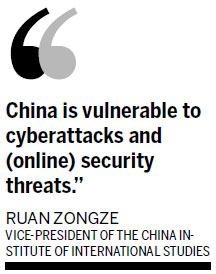'Cyberattacks biggest threat to security'

US spy chief says online espionage poses a greater risk than terrorism
Cyberattacks and cyberespionage have replaced terrorism as the top threat facing the United States, the US spy chief said in a report on Tuesday.
China and Russia are two of the most "advanced cyberactors" but are unlikely to launch an attack, James Clapper, the director of national intelligence, said in an annual assessment prepared for lawmakers.
The threat of a digital assault that could cripple a regional power network is genuine but remains a "remote" possibility, he said.
Unlike previous reports, the assessment ranked cyberattacks first on a list of transnational threats, devoting more words to digital hacking and cyberspying than to Islamist extremists in Afghanistan.
Analysts noted that Clapper's remarks came in tandem with US allegations that China is a major source of cyberattacks, adding that Washington's increasing attention to Internet security is no more than political posturing.
Meanwhile, US President Barack Obama was scheduled to sit down with corporate heads on Wednesday to discuss efforts to improve cybersecurity in private industries.
The White House said that in the meeting, which was to take place in the Situation Room, Obama planned to discuss efforts to address the cyberthreat and solicit the CEOs' input on how the government and private sector can best work together to improve the country's cybersecurity.
Reuters reported that the presidential meeting was planned amid "rising concern about hacking attacks emanating from China".
Washington's hype
Su Hao, a professor of security affairs at China Foreign Affairs University, said Washington's recent moves to highlight the importance of cybersecurity poured in after Washington hyped China's cyberspace threat in the past months.
Although Clapper avoided naming China as responsible for cyberattacks, Su said, "Washington's consistent emphasis and agenda on cybersecurity is also trying to exert more influence on China and call on China for more so-called transparency".
China has strongly denied a report delivered in February by private US Internet-security firm Mandiant that alleged a secret Chinese military unit in Shanghai was behind years of cyberattacks against US companies. And in a speech in New York on Monday, White House National Security Adviser Tom Donilon said Beijing needs to recognize the scope of the cybersecurity problem.
US businesses have been increasingly concerned about the targeted theft of confidential business information and proprietary technologies through cyberintrusions originating from China, Donilon said in a speech to The Asia Society.
However, the report on Tuesday by the US spy chief said there is only a "remote chance" of a major cyberattack on the US that would cause widespread disruptions, such as regional power outages. Most countries or groups don't have the capacity to pull it off, CNN reported.
Ruan Zongze, vice-president of the China Institute of International Studies, said China is a major user of the Internet, but "it is still not an Internet power", indicating that there is a long way for the country to go in its cyberstrength.
"China is vulnerable to cyberattacks and (online) security threats," Ruan said.
China is "also one of those suffering the most from cyberattacks," Foreign Ministry spokeswoman Hua Chunying told reporters on Tuesday.
In 2012, 32,000 IP addresses conducted remote control over nearly 38,000 websites in China through backdoor implantation, according to a report by the National Computer Network Emergency Response Technical Team Coordination Center of China in 2012.
Washington is now seeking to build a dialogue mechanism with China on cybersecurity, but the security sector has been viewed by Washington as of "reciprocal threats and reciprocal intimidation", said Su Hao, the CFAU professor.
Attacks originating from the US account for a considerable amount of overall cyberattacks on China, China's Ministry of National Defense said in February. What is necessary in cyberspace "is not war, but rather regulation and cooperation", said Hua, the Foreign Ministry spokeswoman.
Yuan Peng, an expert on US studies at the China Institutes of Contemporary International Relations, said Washington and Beijing can seek further cooperation on several pillars, including cyberspace.
Reuters and AFP contributed to this story.
zhangyunbi@chinadaily.com.cn
(China Daily 03/14/2013 page11)















